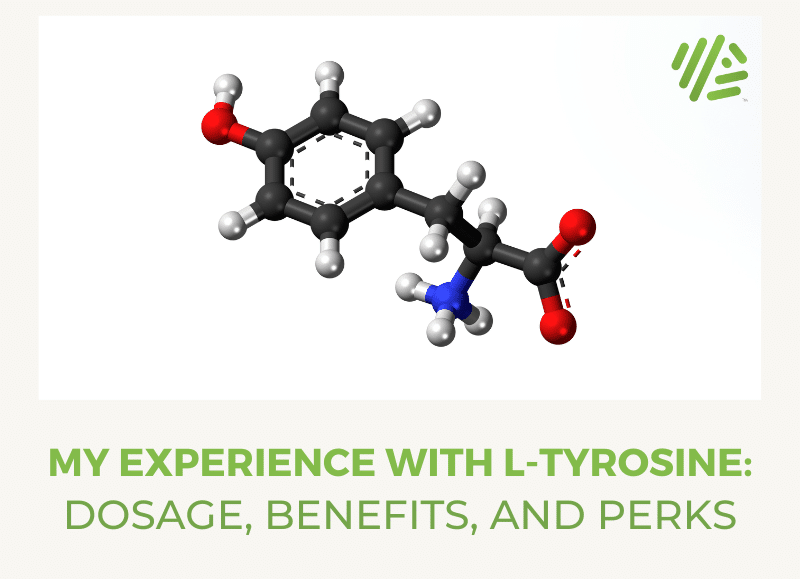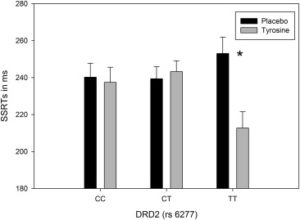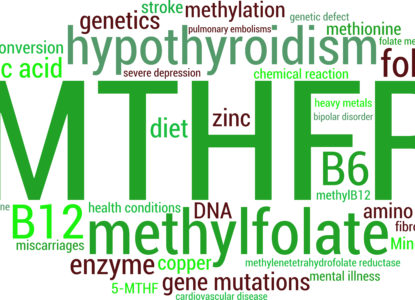My experience with L-Tyrosine: dosage, benefits, and perks
Genes Mentioned

L-tyrosine is an amino acid that is a precursor to dopamine production. 1 Tyrosine is one of the many naturally-occurring, nonessential amino acids that can be derived from the essential amino acid phenylalanine, which is found in protein-rich foods.
High tyrosine foods include meats, cheeses, and vegetables high in protein like kale and spinach.
L-Tyrosine and genetics
One of the best-cited benefits to supplementing with L-tyrosine is its ability to prevent a decline in cognitive performance, and the impact does seem to be affected by genetics.
The DDR2 gene

In a 2016 study, researchers identified that the snp rs6277 in the DDR2 (dopamine D2 receptor) gene demonstrated some interesting differences following l-tyrosine supplementation. 3 Previous studies have suggested that those carrying the risk allele ‘T’ may have reduced levels of dopamine in the striatum region of their brain, which is involved in multiple aspects of cognition.
In the graph above you can see the relative score on a cognitive test for those carrying the ‘C’ allele and the risk ‘T’ allele. The black bars show those who just received a placebo and the grey bars show those taking l-tyrosine (2 g 1 hour before being tested) the lower the bar the better the performance. What first jumps out is that, in the placebo groups, there is little difference between the black bars (there is a slight increase for those with two copies (TT) but it is not significant). However, for those who took l-tyrosine the results are much different. Those carrying any number of copies of the ‘C’ allele did not show any effect from l-tyrosine supplementation. It was a different story for “TT” individuals who showed a large and significant improvement in their cognitive score one hour after taking L-tyrosine. The researchers don’t investigate it, but it would be interesting to see what effect sustained supplementation (probably at a lower dose) had on cognitive performance over time.
COMT and cognition
The next obvious gene of interest when discussing L-tyrosine is COMT. In a similar way to DDR2, COMT has been shown to regulate the levels of dopamine in the brain with the G472A (rs4680 ‘G’ is risk for cognition) and C186T (rs4633 ‘C’ is risk for cognition) SNPs being associated with impaired cognitive performance.4 It is therefore interesting that the association between COMT genotype and l-tyrosine hasn’t been investigated, especially as each SNP variant is relatively common. Researchers have hypothesized an effect, but no studies have been performed or reported.5
MAOA
The next gene that’s worth discussing is MAOA. This is one of the more famous genes out there due to its nickname of “The Warrior Gene”. We’ve got a post explaining how this association is pretty tenuous. While the psychological effect of the various SNPs in MAOA may be oversold, their effect on dopamine and other neurotransmitter levels isn’t. Getting a handle on your MAOA type is quite tricky, but we detail it in the post I link to above. Back to l-tyrosine. Those with reduced MAO-A activity, which is marked by the 2, 3 and 5 R types may want to take care supplementing with l tyrosine. Their dopamine levels are already likely elevated, so making more may not necessarily be the best course of action. However, as above this is a hypothesized effect and there are no actual studies investigating any link.
First hand account of L-Tyrosine supplementation
A Gene Food team member added his experience supplementing with L-tyrosine, below.
Back to Taylor. I sometimes take 1,500 milligrams of l-tyrosine in the morning before eating breakfast. I’ve taken my dose both before and after meals, and have generally found that taking it before eating, shortly after waking up, produces the best effects. But how useful is it? For me personally, and your personal results may vary, l-tyrosine has become a go-to supplement that I’ll be keeping in my medicine cabinet for the foreseeable future. When you’re working in startups, distractions and interruptions are just an aspect of life that you learn to deal with – but that doesn’t make them any less stressful. That project you are neck deep in at the moment that’s due in an hour? Sure would be a shame to have a client call right about now to derail you. Oh, you’re working on an ad campaign? Wouldn’t it just be terrible if Facebook decided to refresh your page for some reason and cause you to lose all of the progress you’ve made? While these may seem minor and relatively insignificant on their own, this kind of constant-buzzing at the quantity it occurs is something that makes focusing pretty tricky during the day. Now, I don’t want to say that l-tyrosine was a miracle sort of cure-all, but I will say that I’ve noticed a distinct change in my reactions to these little micro-aggressors. My focus improved. Dropping what I’m doing to shift gears is an inconvenience, but not one that stresses me out anymore – I feel like I’m on my game, and switching around tasks to make sure everything gets done properly is just a brief intermission. My ability to focus feels refined, and I find it much easier to simply not stress about things that in the long run don’t matter as much as they may seem to at the time.
Ultimately, I feel that this supplement helps me in two primary areas: Stress – Don’t sweat the small stuff has transformed from cliche motivational quip to something I find myself subconsciously practicing more often. If it’s not going to matter enough to be stressed out about a few days from now, it doesn’t matter enough to be stressed out about it now. Focus – Anybody that works on the computer for the majority (or entirety) of their day knows how temptation hides around every corner; all it takes is a simple popup from Facebook at the bottom of your screen to find yourself suddenly diving down a rabbit hole of funny pictures while your work sits in an adjacent browser tab. The temptation just doesn’t hit as hard anymore, and I find myself much more easily committing to a task and finishing it with the ability to tune nearly everything else out. While it may not be useful to everybody (as some of the studies have concluded), I’ve found that my genetic cocktail is made up of ingredients that make l-tyrosine a go-to supplement that I won’t be looking to abandon anytime soon.
When not to take L-tyrosine
While L-tyrosine increases dopamine, it also increases adrenaline and therefore should never be taken in the evening or before bed. According to the medical team at Mount Sinai Hospital, Tyrosine increases levels of thyroid hormone and is therefore contraindicated for people with hyperthyroidism or Graves disease. Also from Mount Sinai – people taking a class of antidepressants known as MAOI Inhibitors should avoid L-tyrosine supplements because, when combined with these antidepressants, tyrosine may raise blood pressure so high as to cause a stroke or heart attack.




Was looking for information about tyrosine after hearing that it helps some people get off caffeine. Very informative.
I found this page after researching l-tyrosine as a result of reading a book called The Mood Cure. It goes into great detail about the different types of neurotransmitter imbalances we experience and how to supplement w tyrosine, 5htp, etc. I’ve found thF taking tyrosine greatly increases my focus and I do not need my morning caffeine. I suggest anyone interested take a look at Fhe Mood Cufe for more in depth info. Thanks for the insight and all the vest.
Thank you for excellent post. It was very informative. I’m a veteran and have battled anxiety and depression for years. I just started taking l-tyrosine recently. About an hour after just taking one 500mg capsule, that place in my chest where the anxiety usually dwells has been replaced by a much lighter and less worrisome feeling. Over the years I’ve been on at least 10 different SSRI and SNRI medications and none of them have even come close to alleviating my symptoms like tyrosine. It could just be a placebo effect that my hope has conjured up but I surely hope not. Thank you again!
I started using l tyrosine about 5 years ago. I was working a high stress job, and battling depression.
I used to dissolve a 1/2 capsule in my coffee in the morning, and it gave me focus, and helped me deal with my anxiety.
It seemed strange to me that such a small amount worked, when the bottle reccomended 1-3 capsules 3 times a day…
One thing to note, I stopped to due to one possible side effect, heart arrythmia. Not sure if due to the tyrosine, but just something people should be aware of.
Hmm. Tyrosine is a precursor to Dopamine. “Worrier” type COMT folks typically have anxiety because their Dopamine and Epinephrine are already too high. You ID yourself as the Worrier type, are you saying that even more Dopamine makes you feel better?
I cannot seem to locate the information on how to decrease l-tyrosine or how long for it to clear the system.
I was turned onto this by an attorney friend of mine. He used it several times while studying for the BAR exam. So I figured hey why not, while I was studying for various IT certification exams varying in difficulty. It helped me focus to a razor sharp spectrum.
Like you Taylor, I worry about everything, it was really terrible when I was in the military. However, this doesn’t totally get rid of it, but does make it tone down to a manageable level.
Couldn’t agree more with you Kyle. I think the biggest perk to me is that it helps tune out some of the noise and distractions a bit, which is great, and sometimes just exactly what we need.
I know what you mean about Ltyrosine helped me feel amazing I’ve done a lot of reading and and has many benefits. It’s given to x heroine addicts to help them seen off,.good.for people experiencing a death somit helps w the blues, makes you more energized social and focused. But I did notice after some time of constant use it wears off. I looked it up and discovered that we build up a tolerance to it so after a while higher doses are required :/
Hi Martha,
Totally agree with you on all of the benefits, it’s definitely become one of my favorite supplements!
I also agree on the tolerance bit, as I’ve noticed the same thing myself. Typically after finishing up a bottle I’ll wait 2-3 weeks before ordering it again to take a bit of a break before jumping back in with it to help combat this. Might be worth giving a shot yourself?
Taylor
Aaron, since COMT “worriers” have elevated levels of dopamine in the brain, does that mean L-tyrosine is contraindicated for those carriers as well as the MAOA genotypes you mentioned in the post?
Hey John,
I hadn’t actually thought about it that way but you’re probably correct. Because of the pathways involved though I think there might be quite a bit of individual variation so some people may be fine. But it would definitely be something those at risk should look out for, and consider starting at lower doses if they wanted to supplement.